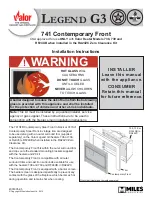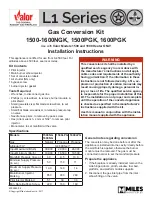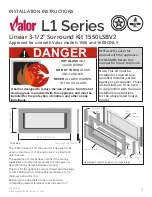
Listen for a snap sound at the gas tap.
Note the time when the sound is heard.
This
sound is caused by an electromagnetic valve shutting off the gas supply through the tap.
The valve is located in the body of the tap. The valve should operate
within 60 seconds
of the pilot going out.
If the valve does not operate within this time limit do not allow
the appliance to be used until the fault has been corrected.
This monitoring system must not be adjusted, bypassed or put out of operation.
This monitoring system, or any of its parts, must only be exchanged using Baxi
Fires Division authorised parts.
16. FINAL REVIEW
1.
Visually inspect the appliance. Clean off any marks incurred during installation.
2.
Advise the customer how to operate the fire.
3.
Explain to the customer that the appliance has a flame failure and spillage monitoring
system. Point out the explanation of this system shown in the owner guide.
Advise that if the fire goes out for any reason, wait at least three minutes before
relighting. Stress that if the monitoring system repeatedly shuts off the fire, the
appliance should be switched off and a specialist should be consulted. Point out that the
lighting instruction details are on a metal plate attached at the bottom of the appliance.
4.
Advise that the fire may give off a slight odour while new. This is quite normal and
it will disappear after a short period of use.
5.
Advise that any cleaning must only be carried out when the fire is off and cold.
6.
Advise the customer that they should read the owner guide before operating the fire
and always follow the advice in the section headed “Cleaning your fire”.
7.
Advise the customer that the appliance will operate to its maximum potential if the
flue is primed during the first 20 – 30 minutes of use. To do this, simply turn the control
to its highest setting. This will also burn off any carbon deposits that may have formed
during previous use.
If using the appliance for long periods it is beneficial to change between settings. This
will also help to remove any carbon deposits that may form during use.
8.
Recommend that the appliance should be serviced and the chimney inspected by a
competent person (In the UK a CORGI registered person) at least annually.
If the appliance is in premises in the United Kingdom occupied by a tenant, point out
that by law a landlord must have any gas appliance, flue and pipework which is situated
in a tenant’s premises checked for safety at least every 12 months.
9.
Advise the customer that the castings, fascia, firebox and ceramic pieces can be
cleaned as described in the owner guide and that the loose ceramic fuel effect pieces
must be replace as described in those instructions.
Stress that no extra coals/pebbles must be added over and above those supplied with
the appliance and that any replacements must only be the authorised spares. Warn
that ignoring this advice could cause incomplete clearance of the products of
combustion with consequent health hazards.
Page 28
INSTALLER GUIDE






































